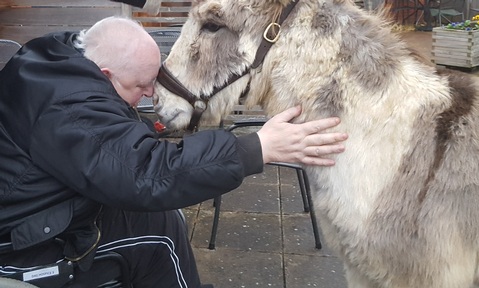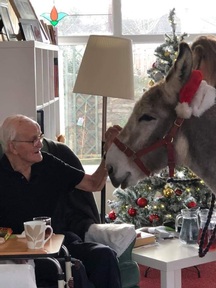Donkey therapy: Care home resident who barely shows emotion smiles
Donkey assisted therapy is growing increasingly popular in care homes, with a founder of a donkey therapy company claiming “visits from donkeys have far-reaching benefits and can have long-lasting effects”.

A recent visit to a care home produced “smiles from one lady who barely shows any emotion. It was beautiful,” revealed care home staff.
Rob Harris set up South East Donkeys nearly three years ago. With a lifelong passion for animals and a keen horse-rider, he takes donkeys to care homes, hospitals and hospices and also trains inexperienced donkeys to become trained members of the working therapy team.
He says: “Stroking an animal has been clinically proven to lower blood pressure and stress levels. The benefits go far beyond that though. Our visits provide residents with something to talk about. Many of them will have owned an animal at some point, or worked on a farm, or ridden a donkey at the beach. It is a conversation starter and because the donkeys are trained to use a lift, the conversation can be taken all around the home.
“For residents who don’t like to join in activities, having a donkey pop its head around their bedroom door can often persuade them to join in and help to break up their day.”
South East Donkeys work closely with their sister company, Danny Donkey & Pals, to provide donkey assisted therapy visits all over the UK. They have seven professionally trained assisted therapy donkeys - Pedro, Charlie, Barney, Rocky, Aubrey, Dermot and Flash. The donkeys wear a nappy to eradicate any concerns over hygiene and are trained to go into bedrooms and right up to residents’ beds to visit residents who are bedbound.

Julie Moody, activities lead at Elizabeth House in Poole, revealed that donkey therapy has had a huge impact at her care home. She said: "The residents of Elizabeth House absolutely adored Dermot the donkey and will be talking about him for some time! We had people react to him that barely react to anything and smiles from one lady who barely shows any emotion. It was beautiful."
Kelly Baker, owner of Danny Donkey & Pals Assisted Therapy, says the benefits the visits provide can touch a huge range of residents. "There are often many residents who, when you bring the donkey into the room, are very vocally appreciative, ask a lot of questions and are desperate to touch the donkey. There are also many though who show a quieter but no less remarkable reaction. Often carers are moved to tears by a resident who doesn’t normally show a lot of emotion, just having a little smile or speaking for the first time that day or even week," she said.
Care homes find donkey therapy can be of huge benefit to residents with dementia. Chris Flannagan, activites coordinator at Hayward Care Centre in Devizes said “Our residents thoroughly enjoyed the visit and it was such a delight to see our residents with severe dementia show non-verbal signs of enjoyment.”
To find out more about donkey therapy go to http://www.donkeyassistedtherapy.co.uk and http://southeastdonkeys.co.uk.
If you are looking for a job in a care home click here
Latest News
 29-Jul-24
Dementia Bus gives carehome.co.uk staff insight into life with dementia
29-Jul-24
Dementia Bus gives carehome.co.uk staff insight into life with dementia
 01-Mar-24
Find out the top care homes in 2024
01-Mar-24
Find out the top care homes in 2024
 21-Mar-23
UK's top care homes in 2023 revealed
21-Mar-23
UK's top care homes in 2023 revealed
 03-Jan-23
carehome.co.uk launches free care helpline
03-Jan-23
carehome.co.uk launches free care helpline
 13-Dec-22
5 mins with Emily Whitehurst, chief operating officer for Constantia Healthcare
13-Dec-22
5 mins with Emily Whitehurst, chief operating officer for Constantia Healthcare